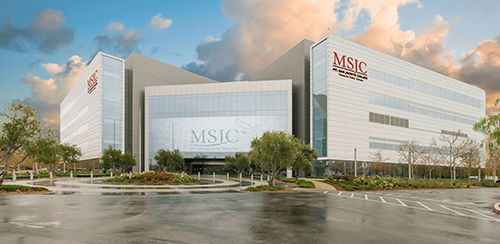$43.3M Temecula Valley Campus Underway for Mt. San Jacinto College
TEMECULA, CA – Construction on Mt. San Jacinto College’s (MSJC) new $43.3-million, 350,000-square-foot Temecula Valley Campus is underway by C.W. Driver Companies. Consisting of a seismic retrofit and tenant improvement of an existing five-story office building, the new campus will allow MSJC to expand access to residents of Southwest Riverside County and the surrounding communities. The improvements also will address current shortages in classroom space across the district.

Previously owned by Abbott Laboratories, the building was purchased by MSJC with Measure AA facilities bond funds, which were approved to fund improvements to existing facilities and purchase new ones to accommodate increasing student enrollment as the region grows. Each of the building’s 175,000-square-foot towers will be converted from office space into classrooms, laboratories, and offices to serve students who are obtaining associates degrees, career certificates, and the necessary courses needed to transfer to four-year universities. The fifth floor will be entirely comprised of lab space, and upgrades will also be made to include a kitchen, fitness center, and lounges for students and faculty to enjoy.
The 27-acre campus is of similar size to MSJC’s Menifee Valley location, which currently serves more than 15,000 students. The first phase of construction, including all seismic retrofits and the full build-out of three floors, is expected to complete in time for the fall 2020 semester. The second phase will complete by summer 2021.
MSJC, part of California’s 115-community college system, is a comprehensive college serving a 1,700-square-mile area from the San Gorgonio Pass to Temecula. This campus is part of the district’s five-year plan, which also includes projects at the San Jacinto, Menifee Valley, and San Gorgonio Pass campuses.